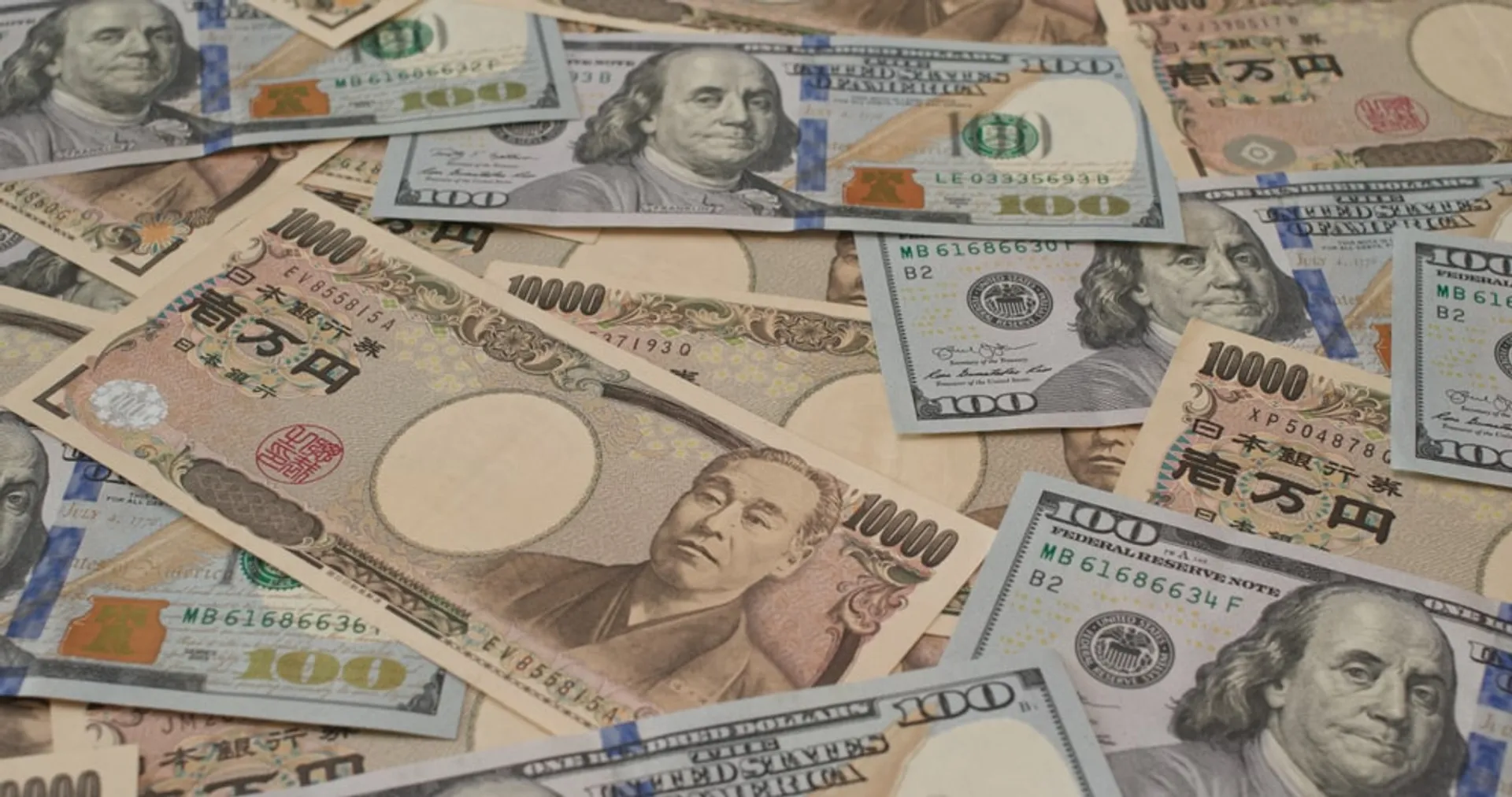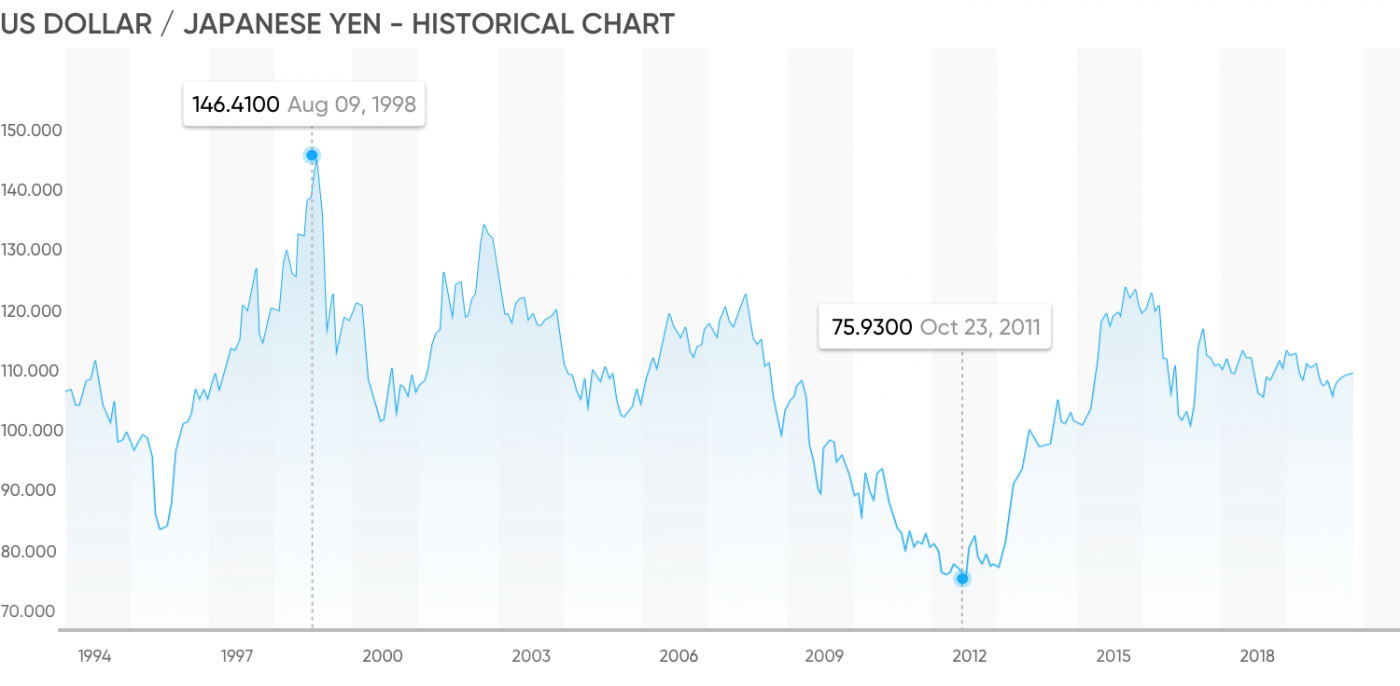Your guide to trading the USD/JPY Forex pair

Why is the USD/JPY an important market?
USD/JPY is one of the most actively traded currency pairs in the forex market, representing a significant quantity of daily trading – used by veteran traders and newcomers alike.
Trade [120]+ forex CFDs with Capital.com.
USD/JPY trading hours
The forex market is available 24 hours a day, five days per week, but UK trading is most active between 8am and 4pm local time. Of course, there will be times during the day when the US dollar to Japanese yen currency pair experiences higher volumes - such as before, during, and after major market announcements.
In the following sections, we're going to take a look at the history of USD/JPY, what factors can influence its movements over time, and why this pair remains so active in trading.
History of USD/JPY
The US dollar remains the world’s most traded currency, and the primary reserve currency held by central banks and institutions globally. Since its establishment as the official currency of the US in the late 18th century, the US dollar has played a pivotal role in international finance, trade, and investment. Its status is underpinned by the size and diversity of the US economy, broad capital markets, and the dollar’s function as the dominant medium of exchange in global transactions.
The Japanese yen is the third most traded currency in the world, and - behind the US dollar, euro, and pound sterling – is the third largest reserve currency in the world, as well as the fourth currency in the International Monetary Fund’s Special Drawing Rights (SDR) basket.
The yen was officially adopted in 1871 by the Meiji government, and as such, has a complex and rich history. Since inception, the yen’s value has grown considerably – in large part – due to the strong Japanese industrial complex, which has comprised technological developments, agricultural innovation, and a range of exportable products. See the USD/JPY chart below (USD/JPY historical data):
See the USD/JPY chart below (USD/JPY historical data):
Factors influencing the USD/JPY CFD
The USD/JPY CFD can be influenced by a range of factors affecting both currencies, including interest rates and macroeconomic conditions.
Role of USD
As the most traded currency in the world, the US dollar is affected by a variety of factors. One of the most influential of these are central bank policy decisions from the US Federal Reserve Bank (Fed). These decisions and related data releases can help traders understand how the market may change in the future.
The Bureau of Labor Statistics releases Non-Farm Payrolls (NFP), usually on the first Friday of each month, which can influence volatility in the value of the USD, potentially impacting the USD/JPY rate.
As with all currencies, economic and political events, and occasional crises can play a part in affecting the fluctuations in the exchange rate. News and data about the US economy and politics are constantly available and should be followed to keep up to date with factors which can influence the markets.
Role of JPY
Japan, like other major economies, is influenced by a broad range of factors which can potentially influence the value of the yen. The usual points can play a part - like the general health of the economy, political events, and the import and export trade in the country.
However, as a small country, Japan’s economy can be affected immensely by events like natural disasters potentially occurring in the region. These types of events can significantly influence the yen and cause significant fluctuations in USD/JPY exchange rates.
Financial institutions, such as Japan’s central bank – the Bank of Japan (BOJ) – release regular reports which can provide valuable insights. The Tankan Report and the Tokyo Area CPI serve as economic indicators. Another factor to consider are the various government economic initiatives which have been issued from time to time in an effort to bolster the strength of the yen - and can clearly affect the USD/JPY rate.
How to trade USD/JPY CFDs
You can speculate on the price movements of USD/JPY either by trading contracts for difference (CFDs) on the currency pair, or by directly trading in the forex market.
CFD trading differs from other forms of trading or investing in that you do not own the underlying asset. A CFD is a financial contract between a broker and a trader, where the parties agree to exchange the difference in value of an underlying asset between the opening and closing of the contract. With CFDs, you do not take ownership of or receive delivery of the actual currency pair, enabling primarily speculative trading.
You may open a long position (buy) if you expect the price of USD/JPY to rise, or a short position (sell) if you anticipate the pair will fall in value.
CFDs are complex instruments and carry a high risk of losing money rapidly due to leverage. A significant proportion of retail investor accounts lose money when trading CFDs. You should ensure you fully understand how CFDs work and carefully consider whether you can afford the risk of losing your money.
Trade US Dollar / Japanese Yen CFD
Past Performance is not a reliable indicator of future results
Why trade USD/JPY CFDs with Capital.com
Advanced technology – our news feed delivers curated content based on your interests; SmartFeed offers analysis and educational material to inform your decisions – recommending videos, articles, and news to help enhance your trading strategy.
Trade on margin – CFDs are traded on margin, (with leverage of up to 20:1 for retail clients on non-major forex pairs such as USD/JPY, subject to jurisdiction and regulatory status. Leverage beyond 1:1 magnifies both potential gains and potential losses.
Contracts for difference (CFDs) – by trading CFDs on USD/JPY, you speculate on whether its price will rise or fall. You can go short or long, set stop-loss and take-profit orders to manage risk, and apply trading scenarios that align with your objectives.*
Sharpen your analysis – stay informed about the latest moves with [100]+ technical indicators – including chart-drawing tools and more. Available on desktop, iOS, and Android.
We prioritise your safety – Capital.com places strong emphasis on security. The platform operates entities authorised and regulated by the FCA, MENA, ASIC, SCB, and CySEC.
Rapid withdrawals – withdrawal requests can be submitted 24/7, and are processed within one business day. Client funds are held in segregated accounts in accordance with local regulations.
*Stop-loss orders aren’t guaranteed. Guaranteed stop-loss orders (GSLOs) incur a fee once activated.
If you want to master forex trading try our step-by-step forex course and explore potential profits and losses on your forex CFD trades with our free forex profit calculator.
FAQ
How is Forex different to other markets?
Forex operates without a central exchange. Trading is decentralised and conducted over the counter, involving a wide range of participants worldwide. This structure tends to result in high trading volumes and can offer competitive bid-ask spreads, potentially lowering trading costs compared to some other markets.
I keep seeing the word 'pip,' what does that mean?
A pip is the smallest increment of trade in the foreign exchange market. It stands for 'percentage in point'. For USD/JPY, which is quoted to two decimal places, a pip refers to a movement of 0.01.
Does Capital.com take commission from my Forex trades?
The simple answer is 'no' – at Capital.com, you only pay the spread – which is the difference between the bid and ask prices – along with any applicable overnight funding charges. This differs from some brokers, who may charge a separate commission on each trade.